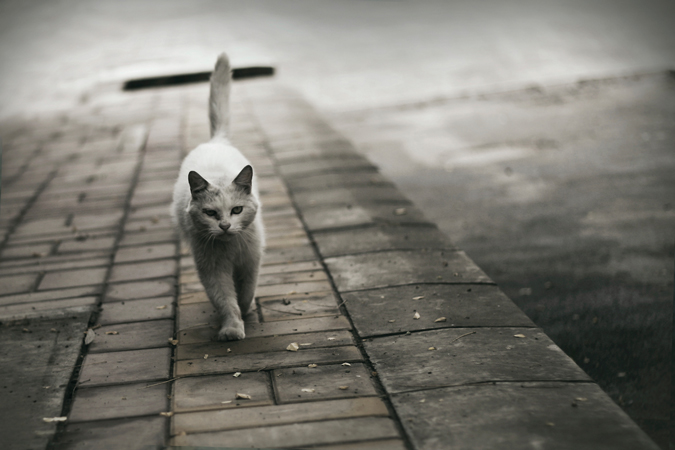When Hamid stops to look out to the Gulf, unstrapping his camera to click the skyline and assorted blue and white cargo ships crawling by, there is something in his stopping that brings them out of the rocks. As he clicks a photo of the Kuwait Towers and admires the watery rooster-tail of a yellow speedboat, he hears them before he sees them, more a whining than a meowing. In his non-camera hand he carries a newspaper, and as he looks down at them they look up at him and seem to believe that his newspaper is the stuff of papery food. Hearing his camera click, they look at one another, ears back, as if to say, What was that? Hear that? What’s that?
As a rule Hamid likes cats, always has, and so as he backs up to the take their photo, they follow, stop, follow, stop, not sure what sort of food he is holding against his face. Although Hamid is not against cats, the world of cats is not a serious consideration, a topic that sparks conversation; of course if he were to think of bigger cats, lions, tigers and leopards, that is something else, something closer to seriousness, the wide savannah of Africa. But whiney Corniche cats? At the rear, a thin gray cat hesitates, and while the others move forward, it thinks nothing of leaning against a rock, reluctant, watchful, and Hamid snaps its picture.
Meanwhile, and not too far away, Khalid is jogging. This is what he does in the morning, sometimes in the afternoon, but always some jogging for sure. In fact, if he doesn’t jog he feels all wrong. At first, it was something he didn’t want to do, doctor’s orders – ‘If you want to live longer, exercise, . . .’ – but did anyway. Now, three months, one week, five days later, he no longer has a choice; he must jog every day. And so Khalid, in full jogging attire – an array of colorful sweat bands, earphones, kneecaps tightly wrapped, jogging shoes that glow in the dark – is minding his own business, when, just like the movies, out of nowhere a dirty calico tomcat steps out from between the breakwater rocks. Thinking that it is his territory, his rocks, does not bother to turn his catty head to see Khalid, a jog step away. The calico is sent somersaulting back into its rocky home, Khalid goes sprawling. His immediate reaction is to see who saw, lifting his head to see a batch of children that-away, an empty walkway the other. Reassured, he turns to grimace, to inspect his scraped palms and bloodied knee. Khalid has nothing against cats; they are contently quiet creatures that when posed just right: eyes closed, secretly humming to themselves, it reminds him of warm butterscotch. But that was before this, his calico collision.
Jena is not a jogger or a photographer, although she does have an expensive camera somewhere in her closet and two or three jogging outfits in that same cluttered square space. But unlike Hamid and Khalid, she thinks cats are important, and to prove it she has two of them at home, sometimes in her room, sometimes not, but two cats for sure with a promise of more to come if she passes her exams with ‘flying colors.’ Cats like Jena too, rubbing against her whenever they can, and she will be quick to reward their friendship with scraps of lunch or dinner. Her two cats see nothing wrong with fighting over these scraps under the table. Jena has decided this is a kind of love, a furry affection. And so, her job on the Corniche among the rock homes of cats is to lure them out with food so they will like her, and maybe even come to need her. When they see her approaching – by now her profile famous in the breakwater feline community – immediately a catty herd forms, a worm-squirm of cats around her ankles. Although psychologists have a word for people like Jena, she feels loved, and cares nothing for psychology.
This fourth and last one, with clipboard in hand, wraparound sunglasses, a gray uniform, works as a consultant for the Center for Animal Control. He is here on official business. A complaint has been made and in this case that is all it takes: the right person complaining to another right person. He moves closer: cats sunning themselves along the walkway, sprawled owner-like atop boulders, minding their own serene business. Jena feeds them because if she didn’t, who would, and they would starve, go cat crazy, attack people flesh. But now it doesn’t matter because a complaint has been filed and he takes notes of what he sees, outlining his plan. What all this means is that someday soon – not on a Friday or Saturday, when kids are out and families are picnicking – but soon, he will drive up in his white van and open the back door take out one of his nets along with an armful of other cat-catching tools, and slowly, methodically, do this duty. After two or three back and forth visits from his van to their breakwater rocks, the cat population along the Corniche will, once again, be under control. Still, a part of the Animal Control directive on his clipboard states that he leave some cats to roam that part of the sea front, because, after all, everybody likes a cat, now and again.











